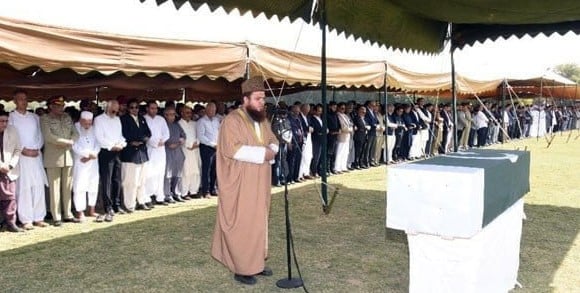On Tuesday, former president General (ret.) Pervez Musharraf was buried at the military cemetery close to the Kala Pul neighborhood of Karachi with full military honors.
High-ranking military officers, including the chairman of the Joint Chiefs of Staff Committee, General Sahir Shamshad Mirza, former army chiefs General (retd) Qamar Javed Bajwa and General (retd) Ashfaq Parvez Kiani, and former ISI chiefs Gen (retd) Shuja Pasha and Gen (retd) Zaheerul Islam, attended the funeral prayer.
Many active-duty and retired officers from the army, navy, and air force were also present at the ceremony.
Former president Pervez Musharraf’s son Bilal, MQM-P leaders Khalid Maqbool Siddiqui, Aminul Haque, Mustafa Kamal, Farogh Naseem, Dr. Farooq Sattar, and Imran Ismail, PTI leaders Fawad Chaudhry and Imran Ismail, and former governor Moinuddin Haider.
On Sunday in Dubai, the formerly in military charge figure died at the age of 79.
A special aircraft carrying Musharraf’s mortal remains landed at Terminal One of the Karachi airport on Monday after flying in from Dubai.
His family brought the former general’s remains.
According to his family, the former president had amyloidosis, a rare disease brought on by a buildup of the abnormal protein amyloid in various body tissues and organs.
The organs and tissues may find it challenging to function properly due to the accumulation of amyloid proteins (deposits).
The All Pakistan Muslim League (APML), Musharraf’s party, revealed that he had a rare disease in 2018, bringing attention to the former leader’s condition.
When the 9/11 attacks on the US occurred, Musharraf, who had seized power in a 1999 bloodless coup, was serving as Pakistan’s army chief, chief executive, and president.
The general was accused of rampant rights abuses, including rounding up opponents during his nearly nine-year rule, twice suspending the country’s Constitution, and rigging a referendum to strengthen his position of power.
However, he emerged as Washington’s most important regional ally during its invasion of the nearby country of Afghanistan.
The decision, made after the US issued a “for us or against us” ultimatum, put him in the sights of Islamist militants, who made several attempts on his life.
But it also brought Pakistan a huge influx of foreign aid, which helped the economy.






